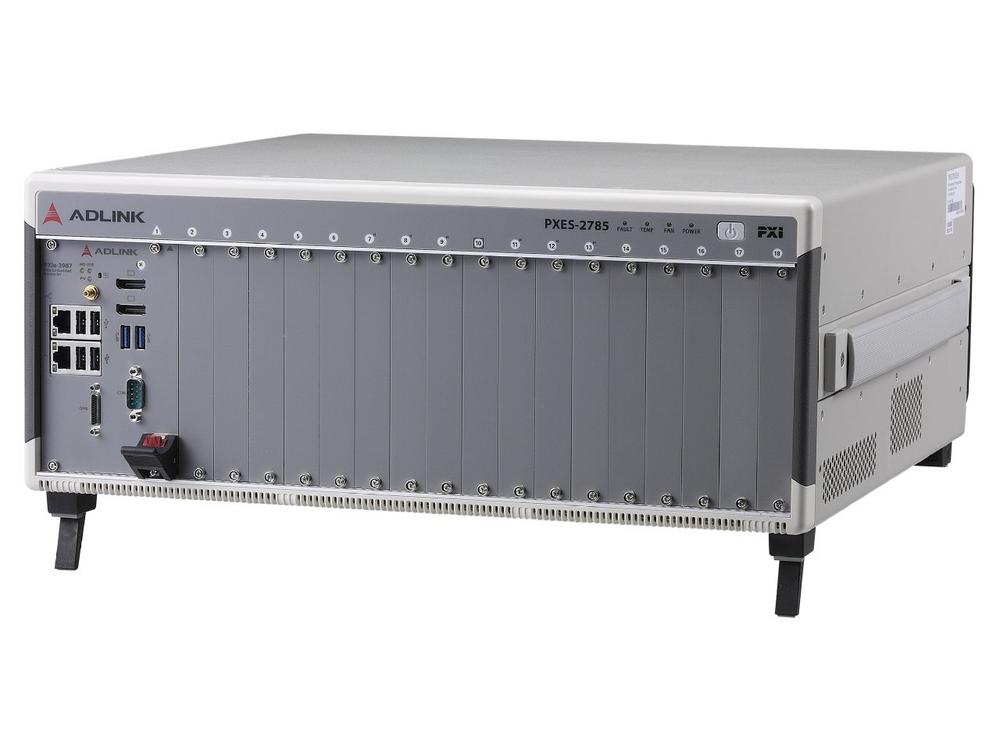Many modern test and measurement applications are exceeding the limits of traditional PXI and PXIe as the quantity and speed of data continues to increase due to the proliferation of high-resolution sensors for real-time data measurement. In addition to increasing bandwidth to 24 GB/s and incorporating PXIe timing and synchronization for high clock accuracy and external clock and trigger timing, ADLINK’s PXIe chassis feature higher power budgets and easily replaceable power supplies and fans.
In step with increased bandwidth is the need for more processing power to process that data. PC-based test equipment with multiple PXI and PXIe modules requires a level of parallel processing that often pushes the limits of high-end CPUs. To solve this issue, server-grade processors, namely Intel® Xeon®, bring the power needed for these testing applications.
PXIe Embedded Controllers
PXIe embedded controllers include the CPU, HDD or SSD, and RAM for test and measurement equipment. Unlike a remote controller that connects the PXI equipment to a computer, the embedded controller puts the computer in the chassis.
ADLINK PXI embedded controllers, based on the Intel® processor family, include dual DisplayPort connectors for two monitors, GbE for LAN connection, GbE for controlling LXI instruments, two USB 3.0 ports for high-speed peripherals, four USB 2.0 ports for peripheral devices and USB instrument control, and a Micro-D GPIB connector for GPIB instrument connection.
ADLINK embedded controllers support Windows. The main difference between the embedded controllers is the CPU, with the PXIe-3937, PXIe-3977, PXIe-3987, and PXIe-3988 featuring Intel® Core™ i3-7100E, Intel® Core™ i5-7440EQ, Intel® Core™ i7-7820EQ, and Intel® Xeon® E-2276ME CPUs respectively.
PXIe Chassis
PXIe chassis use PCI Express technology to provide superior bandwidth and performance for customer applications. As PCIe has matured, each subsequent generation has doubled the per lane per direction data transfer speeds, with generations 1, 2, and 3 providing 250 MB/s, 500 MB/s, and 1 GB/s respectively.
ADLINK PXI Express chassis backplanes have 24 PCIe 3.0 data lanes that deliver 24 GB/s in x1, x4, x8, or x16 configurations. For setup flexibility, peer-to-peer technology enables direct data transfer between peripheral modules without going through the host controller or using CPU and memory resources. Many PXIe peripheral modules are designed to support this peer-to-peer technology.
ADLINK PXI Express chassis cater to multiple application needs, with various slots for an embedded controller, system timing controller, and PXIe modules, and hybrid slots for PXI or PXIe modules. Hybrid slots make it easier to keep using legacy PXI modules when upgrading chassis, saving the costs of replacing functioning cards that are prohibitively expensive to replace.
Other chassis options include high-power power supplies or dual power supplies, field-replaceable power supplies and fans, with the PXES-2785 having 18 slots.
PXIe Applications
PXIe systems provide the communications and data bandwidth needed for many test and measurement applications, including semiconductors, telecommunications, automotive, and data centers. In the electric vehicle segment PXIe enables the testing of batteries, battery management systems, and motors and inverters.
EV Battery Validation To enable EV engineers to ensure batteries meet evolving quality and safety standards and improve battery performance and quality, they need testing equipment that can help them make the most of the battery data. Utilizing the latest PCI Express Gen 3.0 standard, ADLINK PCI Express test and measurement systems offer the performance those engineers need to get those results.
EV Battery Management System Testing With the increasing power delivered by EV batteries and the complexity of EV electronics, the battery management system is critical to maximize the usable life and safety of the batteries in the stack and keep the vehicle running longer and safer. ADLINK PCI Express test and measurement systems can be used with battery simulator cards to test battery management systems.
EV Motor and Inverter Validation Motors and inverters harness energy into forward motion. Integrating third-party equipment and ensuring powertrain integrity are challenges to development teams looking to get higher efficiency and more power from their electric vehicles. ADLINK PCI Express test and measurement systems can accommodate the changing requirements and allow testing earlier in the development cycle and reduce the cost of expensive road tests.
ADLINK Technology Inc. (TAIEX:6166) leads edge computing, the catalyst for a world powered by artificial intelligence. ADLINK manufactures edge hardware and develops edge software for embedded, distributed, and intelligent computing – from powering medical PCs in the intensive care unit to building the world’s first high-speed autonomous race car – more than 1600 customers around the world trust ADLINK for mission-critical success. ADLINK holds top-tier edge partnerships with Intel, NVIDIA, AWS, and SAS, and also participates on the Intel Board of Advisors, ROS 2 Technical Steering Committee and Autoware Foundation Board. ADLINK contributes to open source, robotics, autonomous, IoT and 5G standards initiatives across 24+ consortiums, driving innovation in manufacturing, telecommunications, healthcare, energy, defense, transportation and infotainment. For over 25 years, with 1800+ ADLINKers and 200+ partners, ADLINK enables the technologies of today and tomorrow, advancing technology and society around the world. Follow ADLINK Technology on LinkedIn, Twitter, Facebook or visit www.adlinktech.com.
ADLINK Technology GmbH
Hans-Thoma-Str. 8-10
68163 Mannheim
Telefon: +49 (621) 4321466
Telefax: +49 (621) 4321430
http://www.adlinktech.com
Telefon: +49 (160) 97244669
E-Mail: hyeseon.choi@adlinktech.com
EMEA Marketing Director
Telefon: +49 (151) 126677-36
E-Mail: karen.kulinski@adlinktech.com
E-Mail: chi.lan@adlinktech.com
![]()
